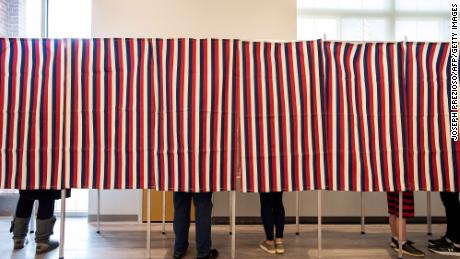(CNN)The Republican efforts to change voting laws around the country after Donald Trump's 2020 loss are often all lumped together as one push. And while they almost all seek to ameliorate fear of widespread fraud that no one has proven exists, the modifications sought actually fall into two distinct groups.
You have proposed bills that seek to change how people vote and ones that propose to change how votes are counted.
The former has received much of the attention from Democrats trying to counter Republicans, but it is the latter that is by far a clearer threat to democracy.
Recall what has happened since people voted in the 2020 election, and what has scared Americans the most. We've seen Trump charge fraud at every turn and try to get results overthrown. There were legitimate audits and recounts in many states that proved Joe Biden won the election fair and square.
Then we saw how fragile the election system can be. In Michigan, for example, officials in Wayne County initially failed to certify the vote. There were real questions whether statewide officials in Michigan would, even as Biden easily won the state.
In Georgia, Republican Secretary of State Brad Raffensperger had to fight off death threats and defend the state's vote count from charges of fraud from other Republicans in and out of the state.
Arizona Senate Republicans have allowed a company that has no experience in ballot counting to go on a goose chase in its"audit" to find fraud long after the election. Republicans in other states have pushed for audits as well.
Simply put, it's not hard to imagine that if different people were counting the vote or if the result had been just a little closer, we might be sitting in a different world. That's what can happen when people believe what they want instead of what is true.
After all, a majority of House Republicans voted to throw out electoral votes from some states. They certainly would have had the backing of a majority of GOP voters who believe Biden only won because of fraud and that Trump is "the true president," according to Reuters/Ipsos polling.
Looking at recently passed or proposed laws in states such as Arkansas, Arizona and Georgia. It's clear that some Republicans do want to change how votes are counted in the future. As NBC's Chuck Todd recently explained, the GOP in these states are often trying to shift election administration power toward officials that are likely to be friendlier to Republicans.
In Arizona and Georgia, the officials who are getting power taken away from them are the ones who defended a legitimate voting system that found Biden won in 2020.
Meanwhile, in Texas, legislators are trying to lower the bar for proving charges of voter fraud. If that happens, then the chance of an election getting thrown out is higher. Again, election fraud is very rare and voter fraud is even rarer.
If everybody acts in good faith and defends legitimate results, then there is nothing to really worry about. The problem is that we've already seen that some people are not attached to reality.Those who are can be punished, such as Rep. Liz Cheney, who was booted from her leadership position in the House Republican caucus after continuously speaking out against Trump and his election lies.
Yet, Democrats seem to have little legislative response to these types of changes in voting laws, as folks like The New York Times' Nate Cohn have pointed out.
Much of the attention has instead been paid to laws that change how people -- bills that aim to, among other things, reduce early voting hours, increase use of voter identification and make it more difficult to vote by mail.
Not surprisingly, all of these changes theoretically hurt Democrats more than Republicans. The data shows or suggests that Democrats find it harder to get off of work to vote, are less likely to have proper identification and were more likely to vote by mail in 2020.
But as I have pointed out previously, the long term effects of these efforts may be minimal. Studies even indicate that the backlash against voter identification laws could temporarily help Democrats. Overall, these studies are inconclusive as to their effects because people can get voter identification, even if it is more difficult for some than others.
Additionally, most people can find other times or ways to vote, even if it is more inconvenient. After all, vote by mail was not really a phenomenon that Democrats took advantage of more than Republicans before 2020.
Voters, however, have very little power once they cast their ballots. They have to hope that the votes will be counted fairly and accurately reflect the will of the people. Voters can do very little , if they aren't.
Democrats would be wise to try to come up with a plan to defend against this type of election legislation. Otherwise, the aftermath of the 2020 election might seem like a walk in the park compared to what happens in the future.




